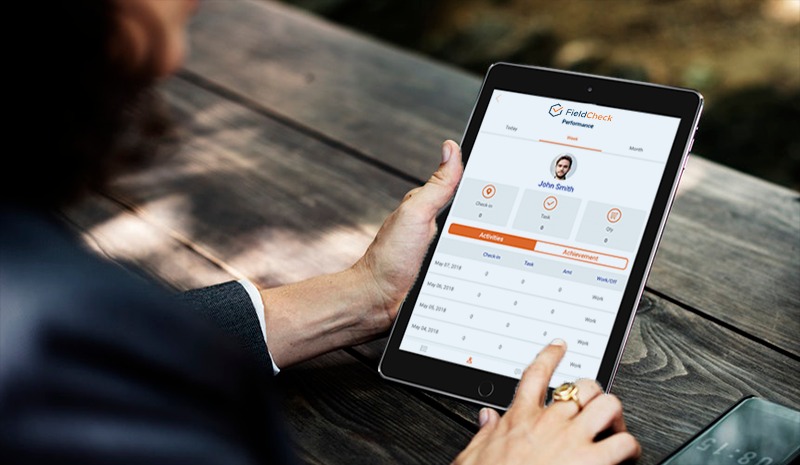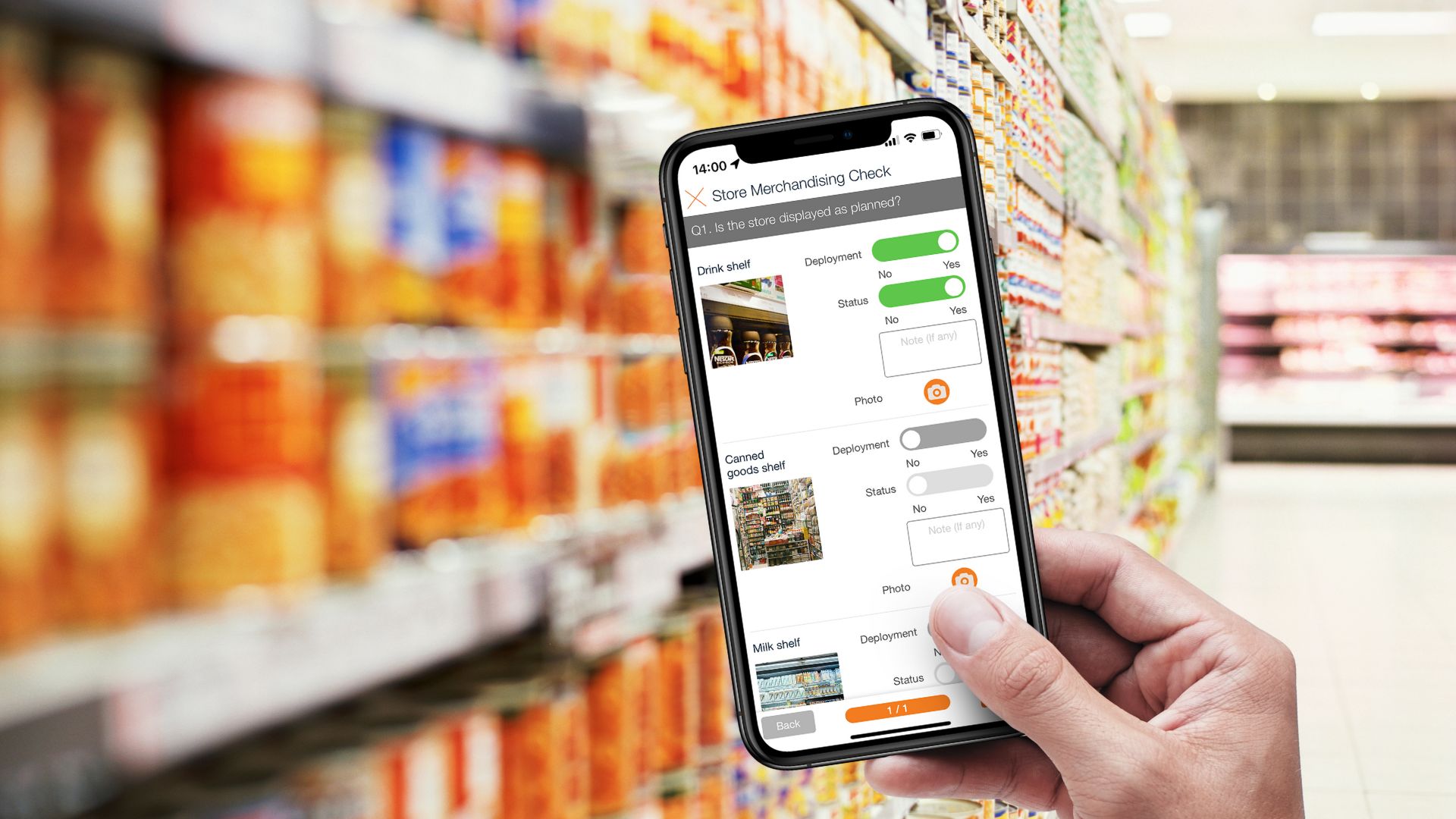Retail Management - The 8 Step Quality Improvement Process
What Is Retail Management?
First, let's learn about the definition of retail management and its importance.
Retail management involves running and managing the day-to-day operations of retail stores. More specifically, the work that store owners and managers do to satisfy customers mainly comes from providing products and services in the store.

Retail management
In addition to facilitating sales, retail management also plays an important role in helping the store operate smoothly and maintain profitability, increasing competitiveness in a vibrant retail environment.
Therefore, retail management is the key to the success of any effective sales strategy that a retail business wants to aim for.
Retail Management Process
As the retail market develops rapidly due to rising consumer demand, retail management is more than just running a traditional store.
It has become the story of retail chains: managing multiple locations and promoting online stores with online stores on e-commerce sites.
However, within the scope of today's article, we will only cover the process of managing chains and physical retail stores.
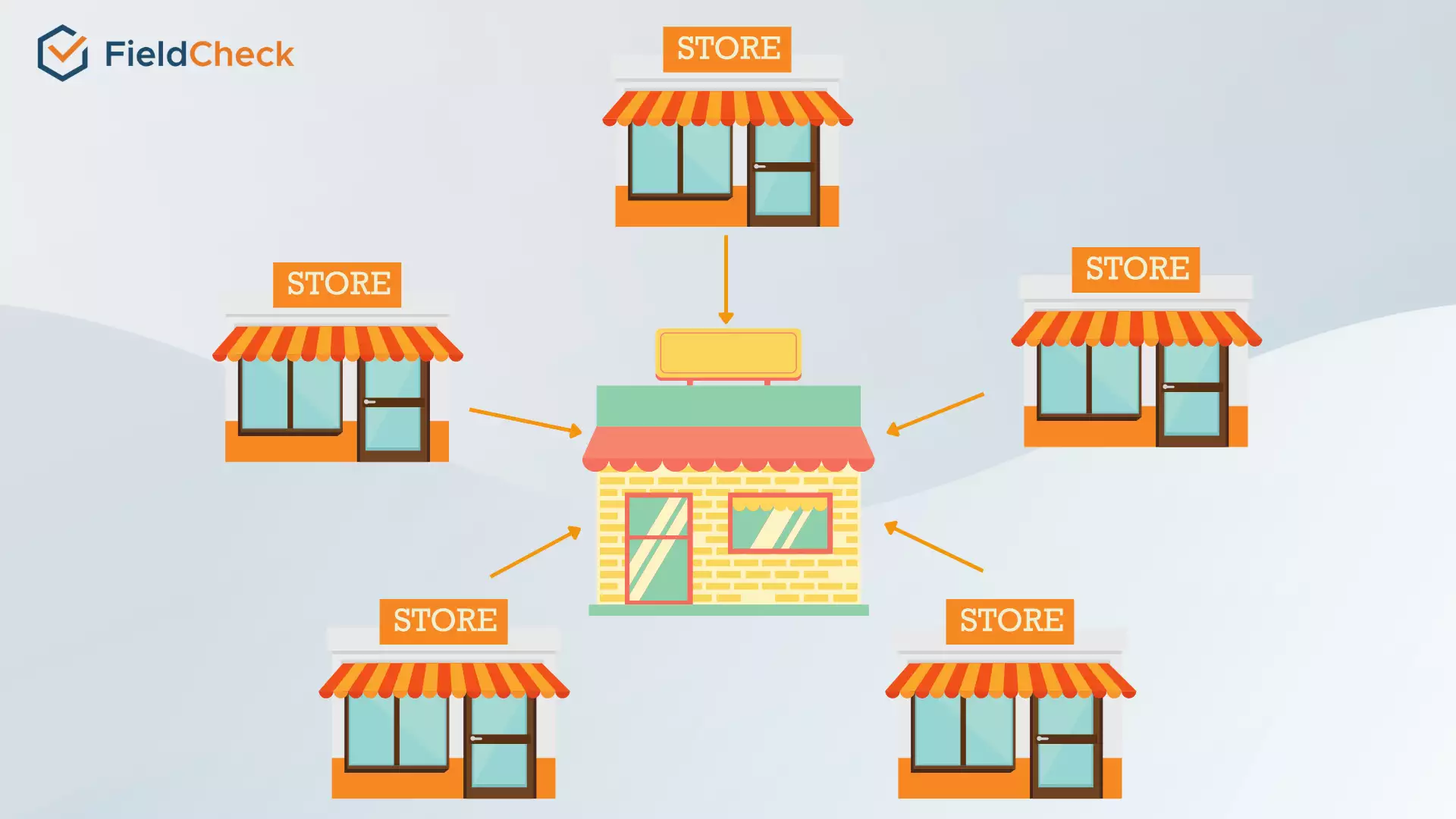
Retail chain store management
The current retail management process consists of activities in the supply chain, visual merchandising, marketing, brand management, store operations, and financial management.
To help you better understand how to do this, refer to the following 8 steps of the retail management process.
1. Market Research
Market research and competitive analysis are essential once you open a retail store. Collecting information on the market about products and needs in society will help retailers get an overview and come up with the right sales strategy for their business line.
Updating market trends is also important to help retailers understand new business methods and improve products and services.
In addition, competitor information analysis helps retailers identify which aspects of the problem they seek to solve but have not yet fully resolved.
Knowing what your competitors are doing can give you a different perspective on problem-solving, giving you the edge to do what they can't or haven't done.

Market research
2. Customer Research
Understanding customers is very important in business, especially in the retail sector.
With the results obtained from market research, businesses will have the basis to develop the right business strategy to improve the quality of products and services while simultaneously creating a connection between the brand and customers. From there, the portraits of potential customers are clearer, helping businesses identify the right audience to target.
The business philosophy of the world's largest insurance group, Prudential, is "always listening, always understanding." This company's "listening and understanding" of customers is reflected in insurance products that meet the financial needs of the majority of people around the world.
Moreover, when introducing products to Prudential's agents, their sales staff will not act as normal "salesmen" but as friends and dedicated consultants.
Customers choose products that bring lasting benefits to their lives and the lives of their loved ones.
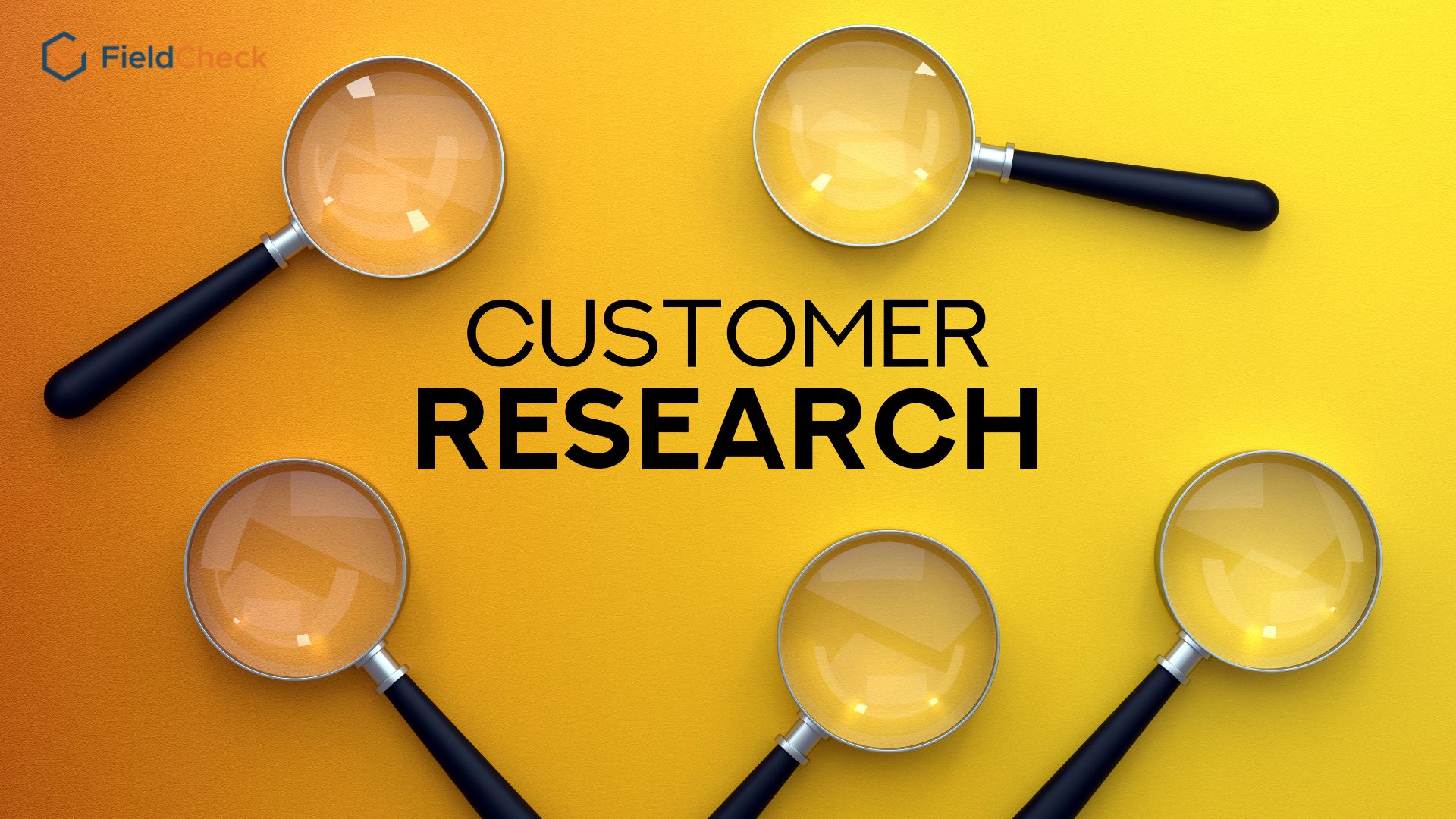
Customer insight
3. Testing And Developing Products And Services
Any new product or service must be tested to determine its effectiveness, and your product or service is no exception.
Therefore, the next stage in the retail management process is to allow users to experience the product, check the reaction, and receive customer feedback.
This step can help you identify your product's or service's strengths and weaknesses, allowing you to focus on what you do best to solve the consumer's problem.
Receiving feedback through customer satisfaction surveys can assist retail management in improving products or services by better meeting customer wants and needs.

Product testing and development
4. Handling All Legal And Financial Matters
The more you scale your business, the more you need to take care of the legal and financial regulations to ensure your products and services are safe before customers use them and your store is running smoothly.
The retail management department's task is to meet product safety inspection and testing regulations and set standards for employees to perform well on store quality.
Financial management is one of the basic issues that must be given the utmost attention in the retail store management process. In addition to complying with the proposed retail price and paying taxes according to state regulations, managers must actively seek additional support for investment capital, change revenue and expenditure policies, and understand the financial issues through periodic monitoring reports.

Legal and finanical affairs
5. Staffing
Recruiting sales staff and sales managers is extremely important for large and chain stores to help them operate more professionally and effectively.
Therefore, managers must plan the interviewing and recruiting process to have the right sales team. After drafting the required number of employees based on the store's situation, the business owner needs to organize training sessions to train the sales staff's professional competence and necessary skills because they are the usual people in direct contact with customers.
In addition, managers also need to monitor the employee's work process to be able to give comments and have a reasonable reward and punishment policy to encourage employees to work better.

Employee recruitment
6. Advertising And Promotion
Building and promoting a business brand to users is necessary for every business store and the retail industry.
While advertising is an activity to increase customer awareness of your products and services, marketing brings your store's image to more people and helps customers reach your products faster. Although it is a way to add value to the business, advertising and marketing activities are quite expensive.
That is why administrators need a reasonable advertising policy to increase efficiency and save costs. One of the ways to market the store's products is to combine traditional marketing channels with online advertising channels to attract customers and increase revenue.
Retail partnerships, promotions, and special in-store events are all effective ways to encourage and entice consumers to buy from you.

Advertise products and services
7. Standardize Operating Procedures
If you want to expand and establish a retail chain, you should first standardize the operation process. Especially as a manager, you must ensure that all the stores are up and running smoothly.
Operating procedures must be consistent across all stores, from business hours and customer care processes to product display and purchasing policies.
After a period of application, you can adjust the process and reissue policies to suit the actual situation at the store better.
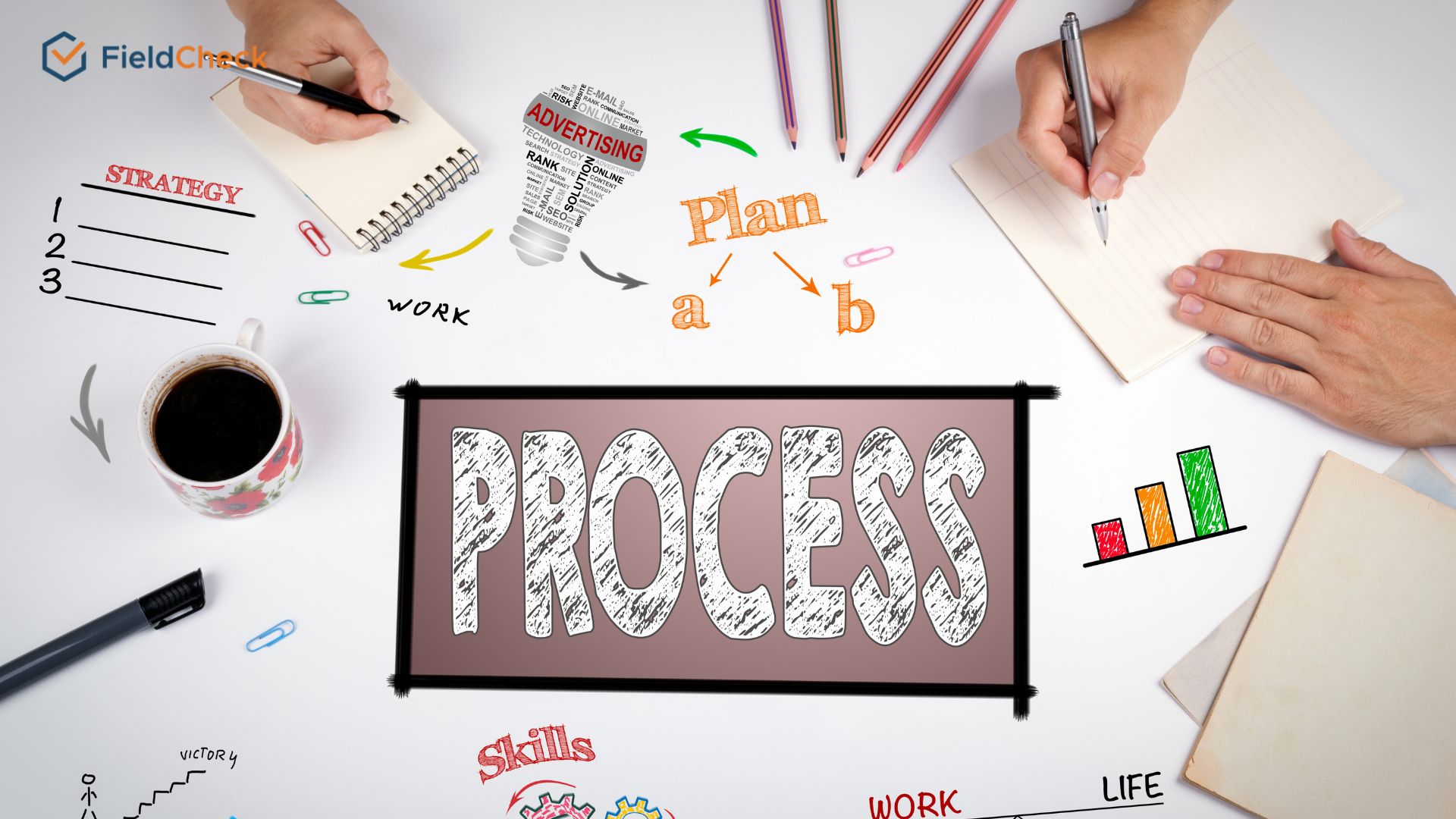
Standardization of operations process
8. Ensure Continuous Improvement
Retail managers must constantly improve their business methods to survive and develop sustainably in the market. When retail management adopts a flexible approach to retail, takes risks, and learns from inefficiencies, they know what needs to be improved in their operations.
If they do not make continuous improvement efforts, their competitors will surpass them and they will face failure, even if they have previously been successful.
Depending on the size of the business and the growth stage, retail managers can try options such as expanding the products or services they offer, changing the store's image, improving the customer experience, etc.

Continuous improvement
Ways to Make Retail More Efficient
To help the retail chain run better, we have compiled some common methods below.
1. Lean Store Display According to 5S Principle
Retail managers can apply 5S standards to retail outlets' design and layout, making it easy for customers to observe and enjoy buying.
The Japanese 5S standard is an organized, neat, and clean space arrangement strategy. In particular, 5S is an abbreviation of 5 Japanese words: Seiri (Sort), Seiton (Set in order), Seiso (Shine), Seiketsu (Standardize), and Shitsuke (Sustain).
Based on this principle, businesses will prioritize the classification and screening of products by object and purpose of use. The screening stage is very important, making it easy for store managers to identify what types of goods require attention and arrange them in an easy-to-see, easy-to-access location.

5S principle
The next stages address every store employee's responsibilities: cleanliness, care, and availability. Accordingly, employees must regularly clean and inspect the facilities to ensure that the store meets the standards according to the quality assessment list prescribed by the business.
However, managers need to determine that 5S is not a one-time application method but requires perseverance through many difficulties before reaching the final goal.
2. Regular Inspection
In addition to performing tasks in the store, managers must also conduct regular inspections. This mission is to help ensure the store is well run and on schedule.
Some of the key points that supervisors need to check to include:
- Goods on the shelf
- How to display shops and goods
- Examine the store for cleanliness.
- Employee work attitude
To comprehensively test all levels of management, it is often necessary to create checklists for better inspection.

Daily checking
3. Personalize The Customer Experience
In addition to providing customers with a good shopping experience, modern retail chains are gradually shifting toward a more personalized customer experience. This strategy aims to increase the rate of loyal customers for chain stores. Thereby, businesses can increase revenue and profit.
Some of the methods businesses can use to personalize the customer experience are:
- Greeting customers by name creates a friendly feeling and makes them feel connected to the store.
- Inquiry: When customers come to the store to make a purchase, the staff can ask to show the store's hospitality to each of its customers.
- Prepare products that customers frequently purchase for repeat customers.

Personalize customer experience
4. Leveraging Technology
With the strong development of information technology and digital transformation in the current era, using software in retail management is inevitable. Manual control of records is no longer suitable for large retailers.
If businesses want to manage more effectively and not be left behind, the application of management software is the optimal solution. It can be sales support software, helping store owners easily control the number of goods, revenue expenditures, and sales activities of the store.
In addition, human resource management software combined with accounting and warehouse management software will help you achieve comprehensive efficiency in your management.
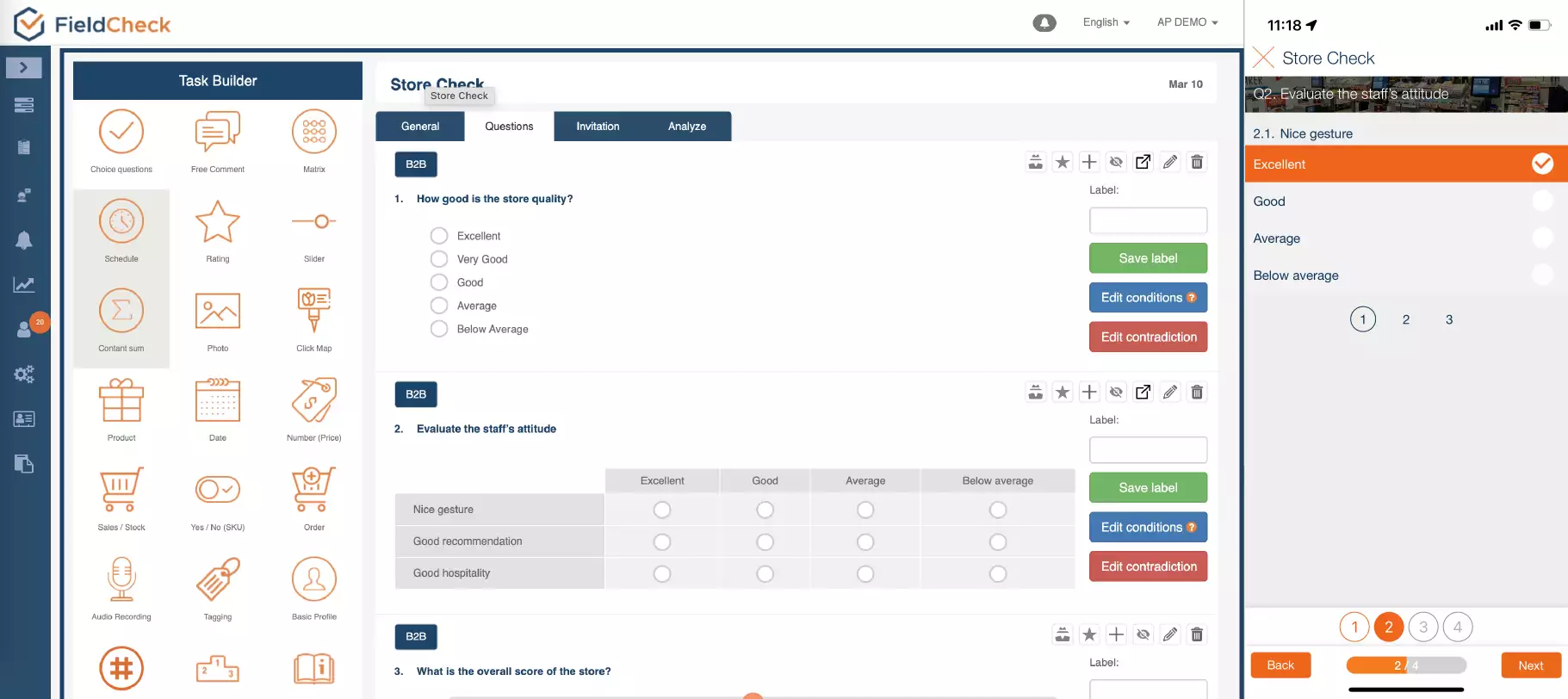
Leveraging technology for retail management
Tools To Optimize Retail Operations
FieldCheck will be a tool to support you in the process of store building and retail management, with many outstanding features as follows:
- Allows managers to approve direct timekeeping and track employee shifts and work hours. At the same time, the software also supports exporting reports showing employee performance based on timekeeping results.
- Update each store's sales in real-time, clearly, and in detail.
- Accurate and timely inventory recording makes it easy for you to grasp the status of your store.
- Provides a map of the locations of the stores.
- Calculate bonuses and commissions for sales staff based on the list of products sold and the formula set up by the administrator.
- Empower employees and assign job responsibilities quickly.
- Support to monitor store quality through a digital checklist.
- Mobile phones allow you to track sales, work performance, and notify customers about product news, promotions, etc.
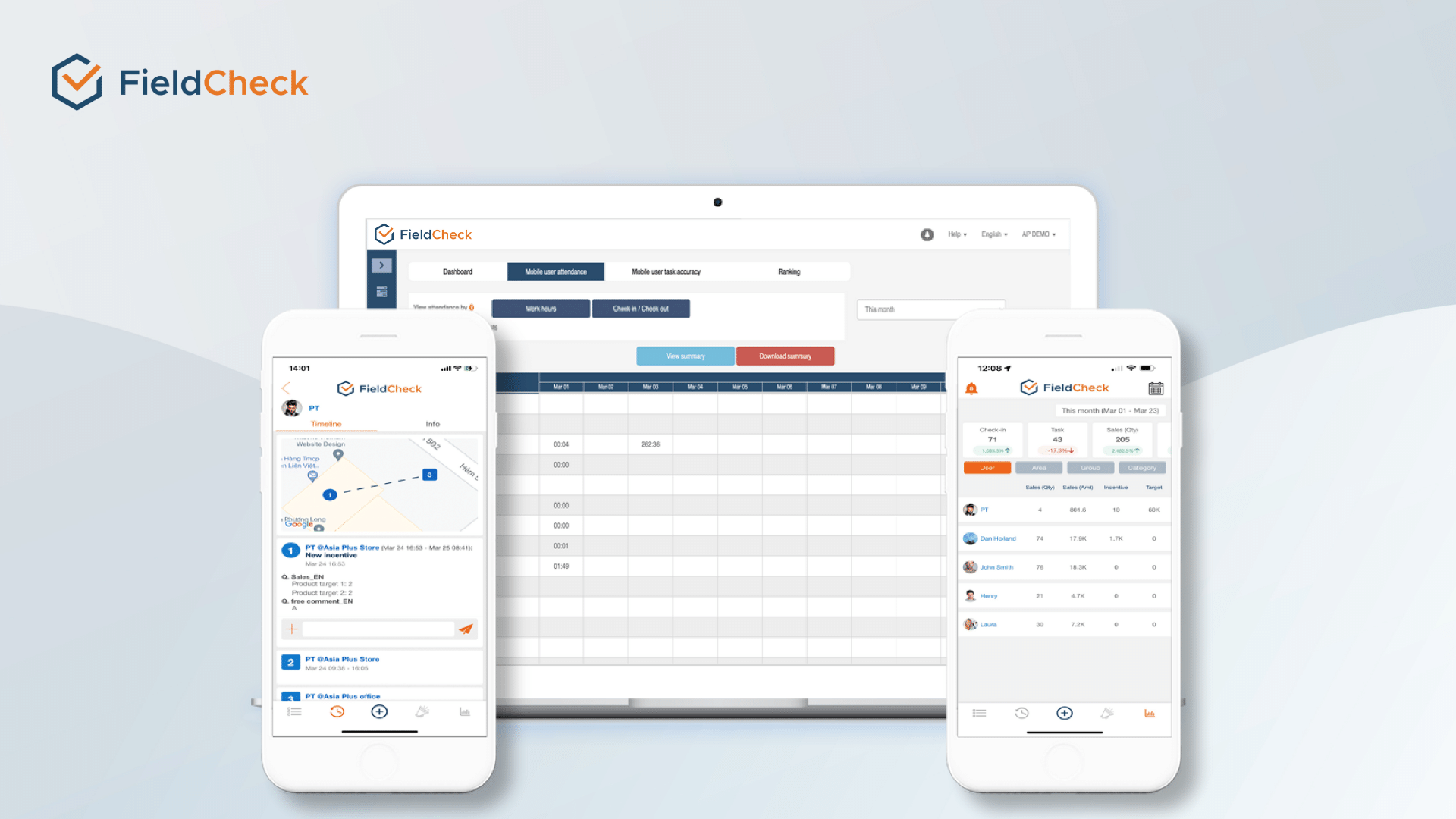
FieldCheck - Utimate retail management software
In addition, many other features support your retail management process more professionally, such as visual merchandising, customer data collection, marketing staff management, etc.
FieldCheck not only acts as a retail management tool but also as a useful information channel, making communication between management and employees easier with the ability to send notifications to mobile devices instantly.
Manage your store operations anytime anywhere with FieldCheck



